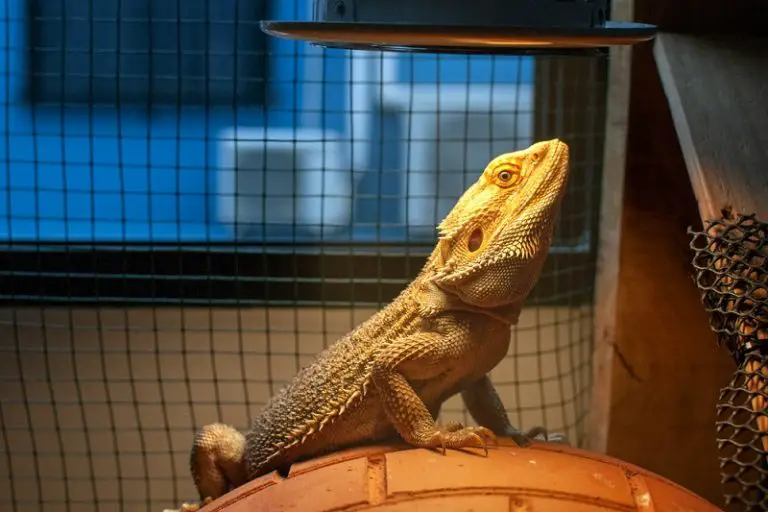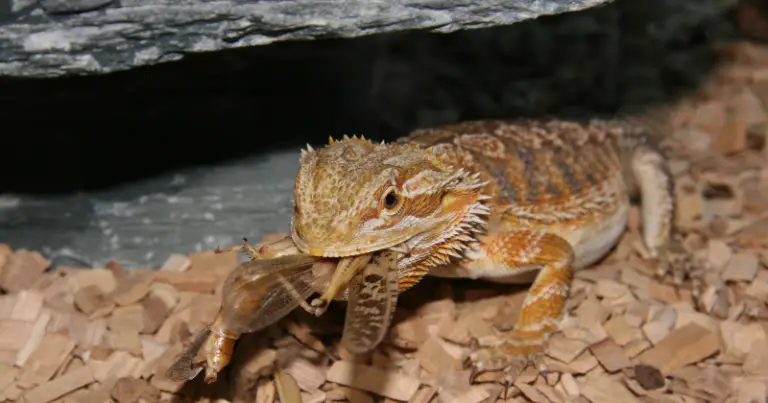Can Bearded Dragons Eat Blueberries?
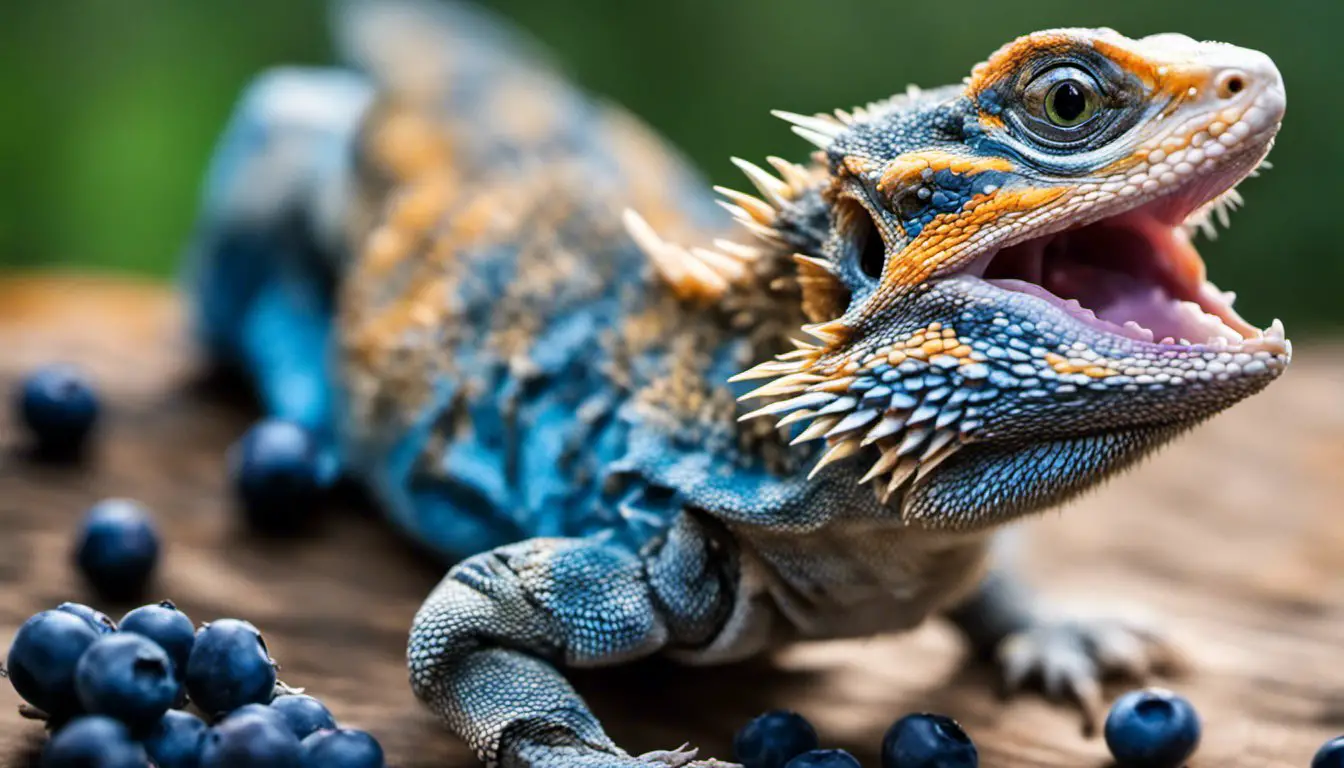
Bearded dragons have become increasingly popular as pets, and as a responsible owner, you want to provide the best possible diet for your scaly friend. One question that often comes up is: Can bearded dragons eat blueberries?
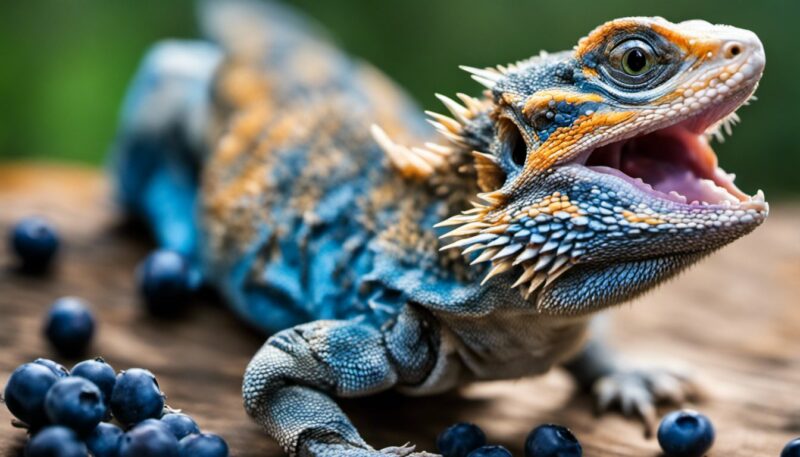
In this blog post, we will explore the pros and cons of incorporating blueberries into your bearded dragon’s diet and guidelines on how to feed them properly. Let’s dive into the world of bearded dragons and blueberries!
Contents
Short Summary
Blueberries can be a nutritious treat for bearded dragons when fed in moderation as part of a balanced diet.
Feed blueberries to your dragon no more than 1-3 times per week, taking age into consideration and washing them thoroughly before serving.
Avoid feeding muffins, jams, or juices containing blueberries
- Instead, feed fresh or frozen berries cautiously to ensure they are high quality.
Can Bearded Dragons Eat Blueberries?
Yes, bearded dragons can eat blueberries as they are a safe and nutritious treat for them. Blueberries are a good source of hydration for bearded dragons as they contain around 85% water. However, it is important to feed blueberries to bearded dragons in moderation as too much of them can lead to health problems. It is also important to ensure that bearded dragons have a balanced diet alongside the blueberries.
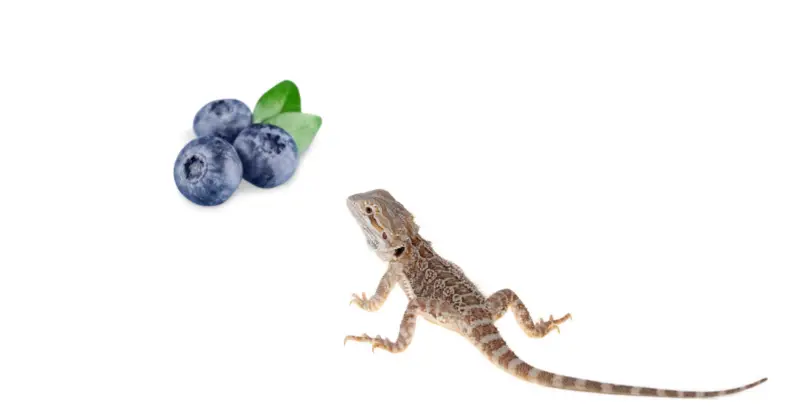
When it comes to feeding bearded dragons, a balanced diet is essential for their overall health. Fruits, including blueberries, can be a part of their diet. In fact, bearded dragons can eat blueberries as they are a safe dietary option for them. However, like any other food, moderation is key.
Let’s look into the advantages and disadvantages of feeding blueberries to your bearded dragon.
The Advantages of Blueberries for Bearded Dragons
Blueberries are known for their high nutritional value, offering a great source of:
Antioxidants
Vitamin C
Potassium
Vitamin K1
Manganese
These nutrients play a crucial role in maintaining your bearded dragon’s health. Blueberries can be offered occasionally, approximately one or two times per week, but not daily.
Fresh blueberries are the preferred food for bearded dragons, but you can also feed them frozen blueberries as a part of a bearded dragon’s diet. This way, you can ensure your pet gets all the essential nutrients when your bearded dragon eats. Just be sure to freeze them first and ensure they are pesticide-free. It’s important to remember that blueberries should be given in moderation to maintain a balanced diet for your bearded dragon.
The Drawbacks of Blueberries for Bearded Dragons
Despite the health benefits of blueberries, some potential risks are associated with feeding them to bearded dragons. Overconsumption of blueberries can lead to health issues, including obesity, dehydration, diarrhea, tooth decay, and inappetence.
An imbalanced calcium-to-phosphorus ratio, found in blueberries, can result in hyperparathyroidism, calcium deficiency, and metabolic bone disease (MBD) in bearded dragons.
To avoid these risks, regulating the number of blueberries given to your bearded dragon is crucial. Blueberries should be offered as a treat or dessert after consuming their main meal. This will help avoid overconsumption and maintain a balanced diet for your bearded dragon.
Feeding Guidelines for Bearded Dragons and Blueberries
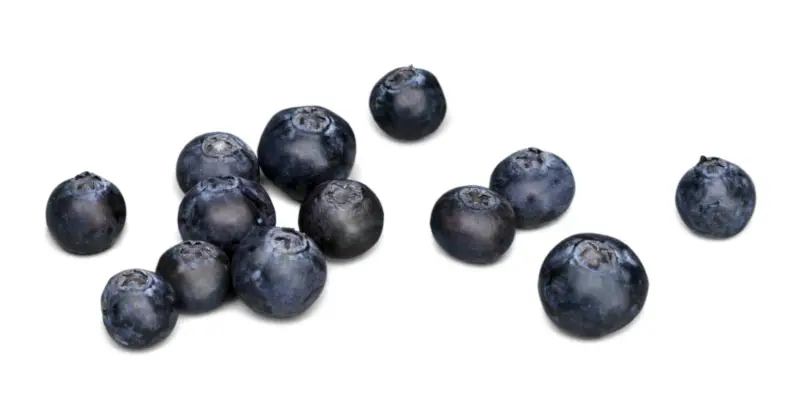
Now that we know the pros and cons of feeding blueberries to bearded dragons, let’s discuss the appropriate serving sizes and frequency for feeding them this tasty treat.
Blueberries should be fed to bearded dragons in small amounts, no more than a few times a week.
Blueberry Serving Size and Frequency
The recommended serving size of blueberries for bearded dragons is a few blueberries per week. Young bears should not eat more than one blueberry per week. Adult bears, however, can have up to three blueberries every week. Be sure to offer blueberries to your bearded dragons on a sporadic basis and in limited amounts to avoid potential health risks.
Choosing the best quality blueberries for your bearded dragon is essential. Here are some tips:
Avoid under-ripe berries that are reddish or green in color, as they may cause digestive distress.
Discard any soft, overly dark, or moldy berries, as they may not suit your pet.
Make sure to wash the blueberries thoroughly before feeding them to your bearded dragon to eliminate any potential pesticides or insecticides.
Age Considerations: Baby vs. Adult Bearded Dragons
The dietary needs of baby and adult bearded dragons differ, which should be considered when feeding them blueberries. Baby bearded dragons should be fed more often and in reduced amounts than adult bearded dragons. It is not recommended for baby bearded dragons to consume blueberries as it can reduce their calcium absorption, harming their bone health.
Providing baby bearded dragons with a diet that is high in protein is essential for their growth and development, as well as ensuring they have strong bones due to their calcium content. When feeding blueberries to baby bearded dragons, it is important to do so in more frequent, smaller quantities than adult bearded dragons, as there is a risk of calcium absorption.
Preparing Blueberries for Your Bearded Dragon

Proper preparation of blueberries is crucial for the safety and enjoyment of your bearded dragon. The following sections will discuss the steps to properly prepare blueberries for your bearded dragon.
Start by washing the blueberries thoroughly to remove any dirt or debris. Rinse and then feed frozen blueberries to preserve their freshness and nutritional value, but be cautious not to give too many blueberries at once.
Selecting and Washing Blueberries
Choosing the best blueberries for your bearded dragon involves selecting berries of a deep blue hue. Avoid under-ripe berries that are reddish or green in color, as they may cause digestive distress. Additionally, discard any soft, overly dark, or moldy berries, as they may not suit your pet. Organic blueberries are preferred to minimize exposure to pesticides and other chemicals.
Before feeding blueberries to your bearded dragon, it is critical to wash them thoroughly to eliminate any potential pesticides or insecticides. Washing the blueberries in cold water will help remove any residue, such as dirt, pesticides, or manure traces.
Cutting and Serving Blueberries
To ensure your bearded dragon’s safety, it is recommended to cut blueberries in half before feeding them. This will help prevent any choking hazards. Blueberries can be fed whole, chopped, or crushed, depending on your bearded dragon’s preference.
When serving blueberries to your bearded dragon, they can be offered as an occasional treat or mixed in with other food items. It is important to monitor your bearded dragon while eating and to serve only small amounts to prevent choking.
Can Bearded Dragons Eat Blueberries? All You Need To Know
Alternative Blueberry Forms and Related Foods
Other forms of blueberries and related foods are available besides fresh blueberries. In this section, we will explore the suitability of these alternatives for pet bearded dragons, keeping in mind that bearded dragons eat blueberries in their fresh form. We will also discuss what bearded dragons eat besides fresh blueberries.
These alternatives include dried blueberries, blueberry powder, and blueberry juice. Dried blue.
Frozen vs. Fresh Blueberries
Fresh blueberries are the preferred food for bearded dragons, but you can also feed them frozen blueberries. This way, you can ensure your pet gets all the essential nutrients. Frozen blueberries have a softer texture than fresh ones, but the flavor may be comparable.
Freezing preserves the antioxidants and nutrients, ensuring that your bearded dragon still benefits from their nutritional content. Just be sure to thaw them first and ensure they are pesticide-free before feeding them to your bearded dragon.
In conclusion, both fresh and frozen blueberries are suitable for bearded dragons to consume, with feeding frozen blueberries a viable option, although fresh blueberries typically offer a juicier, richer texture and a more intense, sweeter taste compared to frozen ones.
Blueberry Leaves, Seeds, and Other Parts
Bearded dragons can consume blueberry leaves, seeds, and other parts. However, limiting their intake of blueberry seeds and other parts is recommended to prevent any potential health issues. If done intentionally, a few leaves in a bearded dragon’s bowl can be acceptable.
When it comes to blueberry seeds, it is essential to monitor your bearded dragon’s intake and make any necessary adjustments to its diet. The same goes for other blueberry parts, as excessive consumption of these parts may lead to health issues.
Blueberry-Containing Foods to Avoid
There are some foods containing blueberries that are not suitable for bearded dragons. These include muffins, jams, or juices that contain blueberries. Blueberry juice, for example, is not recommended for bearded dragons as its high sugar content can lead to diarrhea and gastric upset. Blueberry muffins are also unsuitable for bearded dragons as they contain added sugars and potentially harmful ingredients.
For the optimal health of your bearded dragon, it is advised to avoid these blueberry-containing foods and stick to feeding them fresh or frozen blueberries in moderation as part of a balanced bearded dragon eats diet to keep your bearded dragon healthy.
So.. Can Bearded Dragons Eat Blueberries?
In conclusion, when fed in moderation, blueberries can be a nutritious treat for your bearded dragon. You can provide your bearded dragon with essential nutrients and antioxidants by offering fresh or frozen blueberries.
Remember to properly prepare blueberries, monitor serving sizes and frequency, and avoid blueberry-containing foods that may pose health risks. Following these guidelines ensures your bearded dragon enjoys a tasty treat while maintaining a balanced and healthy diet.
What Else Can Bearded Dragons Eat?
Now that you know about blueberries and Bearded Dragons, what else can they eat? Have a look at some additional items you may want to check out.
Frequently Asked Questions
How many blueberries can a bearded dragon eat?
Bearded dragons can safely have four to five blueberries once a week as a part of their diet. Serving the blueberries mixed in with other greens or vegetables is best.
What fruits are toxic to bearded dragons?
Bearded dragons should not be fed oranges or other citrus fruits, such as lemons and limes, as they are too acidic and can lead to gastrointestinal issues. Raspberries can be consumed occasionally.
What is Beardie’s favorite fruit?
Grapes, apples, and berries are all excellent fruits for bearded dragons to enjoy.
What does a bearded dragon need to eat daily?
Bearded dragons need a well-balanced diet of insects, fruits, and veggies. Baby dragons should be offered feeder insects 1-2 times daily, while juveniles should be fed 3-4 times weekly and adults once daily.
How often should I feed blueberries to my bearded dragon?
It is recommended to offer blueberries to your bearded dragon once or twice a week in limited amounts.


